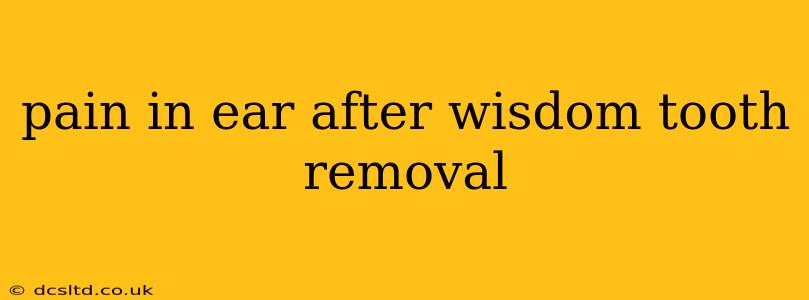Experiencing ear pain after wisdom tooth removal is a common complication that many patients encounter. While often temporary and manageable, it's crucial to understand the reasons behind this discomfort and know when it warrants professional attention. This comprehensive guide explores the causes, provides effective relief strategies, and clarifies when you should seek immediate medical help.
Why Does My Ear Hurt After Wisdom Tooth Extraction?
The connection between your wisdom teeth and your ear might seem surprising, but their proximity explains the pain referral. Several factors can contribute to ear pain post-wisdom tooth extraction:
- Inflammation and Swelling: The surgical site naturally swells after extraction. This swelling can put pressure on the nerves near the jaw, which can radiate pain to the ear. This is the most common cause.
- Dry Socket (Alveolar Osteitis): This painful complication occurs when the blood clot protecting the extraction site dislodges. The exposed bone then becomes irritated, causing intense pain that can spread to the ear and jaw.
- Infection: Although less common with proper post-operative care, infection at the extraction site can lead to increased pain, swelling, and even earache. Symptoms may include fever, throbbing pain, and pus.
- Referred Pain: The nerves in your jaw and ear are closely interconnected. Pain originating from the extraction site can be "referred" to the ear, meaning you feel the pain in your ear even though the source is your jaw.
- Sinus Infection (In Upper Wisdom Teeth Extractions): The proximity of upper wisdom teeth to the sinuses means extraction can sometimes trigger or worsen a sinus infection, leading to ear pain.
What Can I Do to Relieve the Ear Pain?
Several home remedies can provide relief from ear pain following wisdom tooth extraction:
- Ice Packs: Applying ice packs to the affected area can help reduce swelling and numb the pain. Apply for 15-20 minutes at a time, several times a day.
- Over-the-Counter Pain Relievers: Ibuprofen (Advil, Motrin) or acetaminophen (Tylenol) can effectively manage pain and reduce inflammation. Always follow the recommended dosage.
- Saltwater Rinse: Gently rinsing your mouth with warm saltwater can help keep the extraction site clean and prevent infection, potentially reducing associated ear pain.
- Rest: Adequate rest is crucial for healing. Avoid strenuous activities and get plenty of sleep.
- Elevate Your Head: Sleeping with your head elevated can reduce swelling and alleviate pressure on the nerves, helping to lessen ear pain.
How Long Will the Ear Pain Last?
The duration of ear pain varies from person to person. In most cases, the pain should subside within a few days to a week as the swelling reduces. However, if the pain persists or worsens, it's crucial to contact your dentist or oral surgeon.
When Should I Call My Dentist or Oral Surgeon?
Contact your dentist or oral surgeon immediately if you experience:
- Severe or worsening pain: Pain that doesn't respond to over-the-counter medication or that intensifies.
- High fever: A fever indicates a potential infection.
- Increased swelling: Significant swelling that spreads beyond the extraction site.
- Pus or drainage: Any discharge from the extraction site is a sign of possible infection.
- Difficulty swallowing or breathing: These symptoms require urgent medical attention.
- Numbness or tingling in the face: This could indicate nerve damage.
Is Ear Pain After Wisdom Tooth Removal Normal?
Mild to moderate ear pain after wisdom tooth removal is relatively common due to inflammation and referred pain. However, severe or persistent pain, along with other warning signs, is not normal and should prompt a visit to your dentist or oral surgeon.
Can I Prevent Ear Pain After Wisdom Tooth Removal?
While you can't always prevent ear pain, following your dentist's post-operative instructions meticulously can significantly reduce your risk. This includes:
- Taking prescribed medication as directed: This is crucial for managing pain and preventing infection.
- Keeping the extraction site clean: Gentle saltwater rinses help promote healing and reduce the risk of infection.
- Avoiding strenuous activity: Rest is essential for healing.
- Following dietary restrictions: Avoid hot or spicy foods and alcohol.
This information is for general knowledge and shouldn't replace professional medical advice. Always consult with your dentist or oral surgeon for any concerns regarding your wisdom tooth extraction or post-operative pain. They can accurately diagnose the cause of your ear pain and recommend the appropriate treatment.
